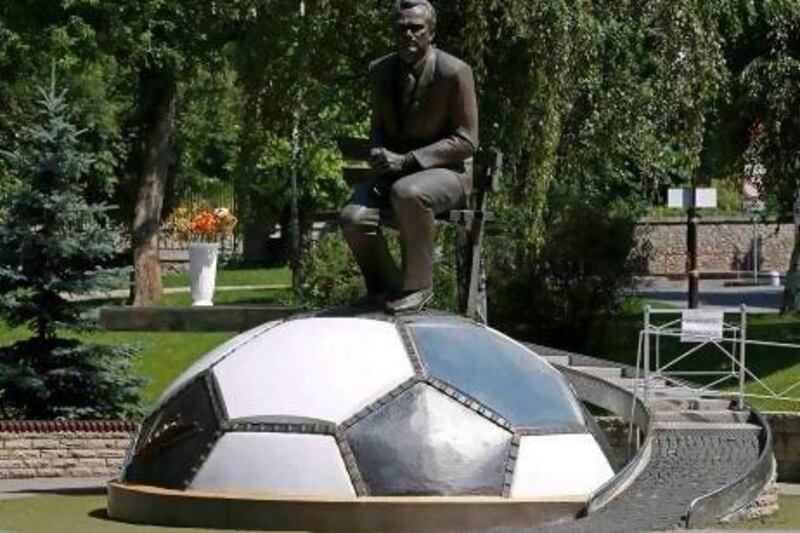While the drama of Euro 2012 has been played out just a short distance away at the Olympic Stadium, thousands of foreign fans have made the pilgrimage to the spiritual home of Ukraine's footballing father Valeriy Lobanovsky.
A winger of breathtaking individual skill, Lobanovsky went on to enjoy great success as a manager and earned a reputation as a football philosopher.
He won the hearts of Ukrainians when Dynamo Kiev claimed the league title for the first time in 1961, a victory that signalled the beginning of the end of Russian dominance in the old Soviet league.
Lobanovsky cut a dour, unsmiling figure as a manager when he turned football into a science, creating a team who dominated in the old Soviet Union and won two European trophies.
A second spell in charge helped establish Dynamo Kiev in the Uefa Champions League era, and he led the national teams of both the Soviet Union and Ukraine, taking the old USSR to the 1988 European Championship final, which they lost to Holland.
As respected in the other former Soviet states as he is in Ukraine, a bronze statue of Lobanovsky, who died 10 years ago at the age of 63, watches over the entrance to the stadium in Kiev that now bears his name.
In the statue, he is poised, leaning forward and attentive, an appropriate stance given that it was his minuscule attention to detail that improved domestic football and made him one of the most-loved sporting figures in his country's history.
"The whole country loves Lobanovsky - in Kiev, in Odessa, in Donetsk. Lobanovsky is the pride of Ukraine," Kirill Boyko told Reuters during a tour of the stadium.
Boyko is head of the Dynamo Kiev fan club and he doubles as the club's public relations man and tour guide for the Lobanovsky Stadium. He says he has shown thousands of fans from all over the world around the facility since Euro 2012 began on June 8.
"Swedes, French, Russian, English, Italian, China, Vietnam, the US - Lobanovksy is known all over the world," he said.
When he hung up his boots, Lobanovsky curtailed his more flamboyant instincts and adopted a scientific approach to the game, saying "everything that is based on emotions does not have anything to do with a proper analysis".
Together with statistician Anatoliy Zelentsov, he developed and refined his mathematical method and introduced a style based on pressing the opposition in different ways.
It was stunningly successful and Boyko rattles off Lobanovsky's achievements at Dynamo with the practised air of the tour guide that he is.
The coach's less-successful spells in charge of the national teams of the UAE and Kuwait are glossed over, dwarfed by his achievements back home.
"He won his first championship in 1961, he won eight championships in the Soviet era, five in Ukraine, six national cups, two European Cup Winners' Cups," Boyko said, adding games and goal scorers as he goes along.
Despite his emphasis on the collective over the individual, Lobanovsky also managed to produce outstanding players such as current Ukraine coach Oleg Blokhin and strikers Andriy Shevchenko and Serhiy Rebrov.
With the museum at the Olympic Stadium closed while the tournament is on, replicas of the Dynamo Kiev trophies won by Lobanovsky are lined up along the wall of an upstairs landing at the stadium.
Over at the fan club office in a separate building, a plaster bust of Lobanovsky with a winner's medal around its neck dominates the room.
Dynamo have moved their home games to the newly-built Olympic Stadium, but the youth and reserve-team players still play at the old ground and Lobanovsky's influence prevails.
Throughout the complex, his presence is never far away and try as they might Blokhin and Shevchenko will have a hard time eclipsing it.
"Blokhin is a great player in Dynamo history, he scored three goals against Bayern Munich on the way to winning the Cup Winners' Cup in 1975," said Boyko, wearing a national team shirt despite their early exit from Euro 2012.
His affection for Shevchenko, who won 111 caps for Ukraine and has just announced his international retirement, is also obvious, but it is nothing compared to the love the Ukrainian people have for the cantankerous Lobanovsky.
After his death in 2002 the nation went into mourning and he was awarded the title "Hero of Ukraine", the nation's highest honour.
"He put Dynamo and Ukraine on the world map – for that he is loved by everybody," Boyko said.
sports@thenational.ae
Follow us
[ @SprtNationalUAE ]





